Ukraine conflict: Back to Minsk with so much at stake
- Published
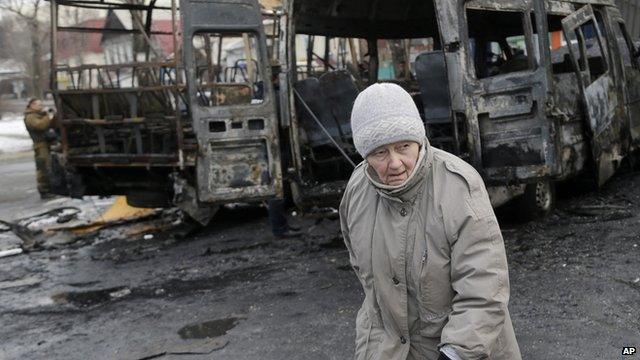
Civilians have been caught up in intensifying violence in Donestk
It is five months since Minsk gave its name to a peace deal for Ukraine.
Now key players are meeting here for what has been widely called "one of the last chances" to stop a widening trail of destruction and death, which threaten the territorial integrity of Ukraine.
The run-up to another Minsk meeting has been marked by an East-West war of words and an intensifying war on the ground.
Pro-Russian separatists have been pushing deeper into government-held ground in eastern Ukraine to try to secure a stronger foothold in advance of any possible ceasefire.
When leaders of France, Germany, Russia and Ukraine sit down in the Belarusian capital, they are hoping to build on the first Minsk protocol agreed last September - even if it failed to force either side to cease fire or help Ukraine re-establish control of its territory.
But much more than the future of Ukraine is at risk in this high stakes diplomacy.
"Europe is heavily engaged in this," former Swedish Foreign Minister Carl Bildt told me during last weekend's Munich Security Forum.
"If this is tolerated here, it opens up a Pandora's box - be that in the Balkans, in Central Asia, or somewhere else in the Russian periphery that would even more fundamentally endanger Europe's security."
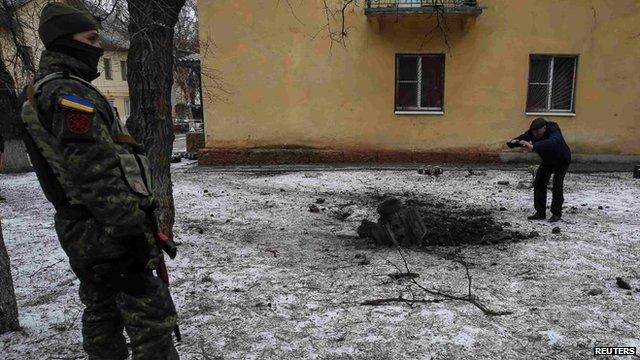
Residential areas in eastern Ukraine have been hit by rockets
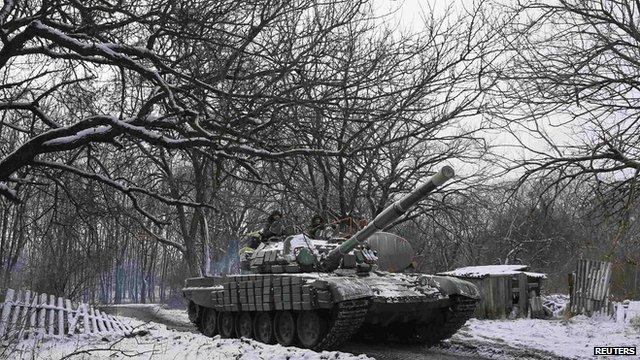
Pro-Russian rebels want recognition of Donetsk and Luhansk as "people's republics"
But Russia also sees, in the tensions over Ukraine, a threat to its strategic core. For Moscow, Europe's intervention amounts to unwarranted aggression in its backyard.
On the brink of an even greater escalation in the worst East-West crisis since the Cold War, Western leaders are deploying all means and measures in their diplomats' toolkit.
American officials warn they are weighing up the despatch of lethal "defensive weapons" to help Ukrainian troops defend themselves against pro-Russian forces.
The EU has put on hold for a week a raft of newly approved sanctions against Russia and the rebels, including asset freezes and visa bans, to give this last ditch effort a "maximum chance of success".
Outlines of a possible agreement include a 30 to 45 mile demilitarised zone between Ukrainian-controlled areas and what are now self-proclaimed People's Republics in Donetsk and Luhansk.
But the ceasefire line drawn last September no longer corresponds to the new map carved in the bloody battles of recent months.

Pro-Russian rebels are defiantly digging in on the ground.
Vladimir Putin has also staked out a similar position during the flurry of negotiations in recent days including five hours of talks on Friday when Germany's Angela Merkel and France's Francois Hollande suddenly flew to Moscow to meet him.
At the Munich Forum, some European officials spoke of "Minsk plus" with palpable unease.
"This is, of course, a very tricky question," Norway's Foreign Minister Borge Brende explained to me.
"Since 5 September there has been an escalation and we have to be realistic and go a bit further to accommodate Russian and pro-Russian supporters."
Despite a mantra repeated at every turn that "Europe's borders are inviolate," many observers expect the very best that can be achieved is a "freezing" of current hostilities. Even that will be difficult.
'Cold war tension'
Details of a draft Minsk deal include the withdrawal of military equipment and illegal armed groups as well as fighters and mercenaries from Ukraine.
There has also been mention of a greater decentralisation of power to the rebel-held regions of Donetsk and Luhansk.
"Its important to ensure freezing the situation is only one step," says Lamberto Zannier, who heads the OSCE whose monitors already on the ground will be expected to oversee any ceasefire.
"We need a broader plan, which must include Russia, on the next step to bring about a reintegration of eastern Ukraine into Ukraine."
In Munich, all the tension and drama of a Cold War encore was on full public display.
Russia's Foreign Minister, Sergei Lavrov, was jeered and mocked when he flatly denied Russia was providing military support to Ukrainian rebels.
Ukraine's President, Petro Poroshenko, brandished two handfuls of Russian passports he said were seized from Russian soldiers and officials - proof, he declared, of Russian aggression.
He insisted no adjustments could be made to the original Minsk deal.
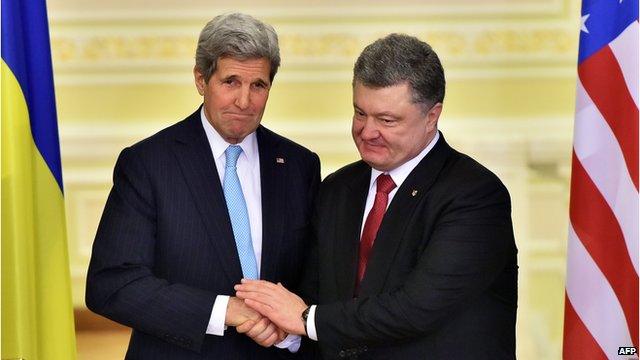
Ukraine's pro-Western leaders hope Washington will send weapons to aid their fight in eastern Ukraine
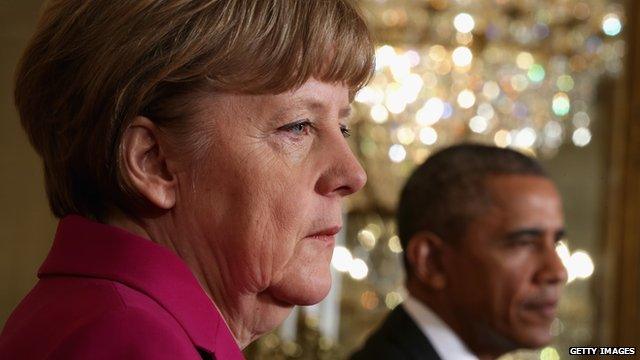
Speaking at the White House Angela Merkel made it clear she opposes sending lethal arms to Ukraine
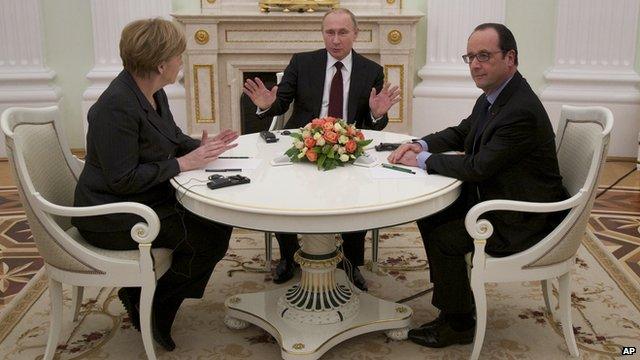
The German Chancellor and French President travelled to Moscow for an emergency meeting with Vladimir Putin
When Germany's Chancellor took to the podium to warn against a Western military reply, her caution was met with derision by a delegation of more hawkish US Republican senators.
Senator John McCain, quoted in the New York Times, external, had a one word riposte, "foolishness".
The threat of a split in the Atlantic Alliance, which has so far spoken with one voice, has added further weight to the urgency of an agreement.
Mrs Merkel, who has played the leading role in the West's outreach to Mr Putin, also reached back in history and drew parallels to the containment policy that ended the Cold War.
For Germany, and most West European nations, sustained economic sanctions are still regarded as the best course of action, although there's also acknowledgement this pressure may not work.
Mrs Merkel has kept repeating what has become her own mantra: "I've always said I don't see a military solution to this conflict."
She said it again when she stood next to President Obama in Washington this week. His refrain, in the caution that has come to define his presidency, was that he had "not made a decision about that yet".
And yet, on the ground, a military escalation has already changed realities. But there is a warning there could be worse to come.
This footage was captured by a mother as shelling neared her apartment block in Kramatorsk on Tuesday. Some may find it distressing
Germany's Foreign Minister Frank-Walter Steinmeier made an impassioned plea in Munich.
He said: "I'm convinced that it would be irresponsible to discount what are perhaps the last chances of de-escalating the conflict.
"The bitter consequence would be the expansion and escalation of the conflict."
With more than 5,000 dead since April, and more than a million displaced, that is what weighs heavy on the minds of leaders who meet in Minsk.